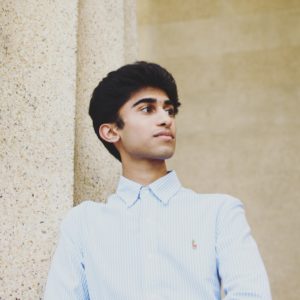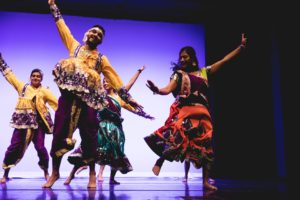Serving Through Health Care: Founder’s Medalist Sumanth Chennareddy BA’20

Sumanth Chennareddy BA’20, a neuroscience major and Spanish minor, is this year’s Founder’s Medalist for the College of Arts and Science. The Founder’s Medal is a 143-year-old tradition that recognizes the top graduating student from each of Vanderbilt’s 10 schools and colleges.
The recipient of the Martin F. McNamara, Jr. Honor Scholarship, Chennareddy served as a student researcher, VUceptor, vice president of the South Asian Cultural Exchange, and volunteer Spanish interpreter at Vanderbilt School of Medicine’s student-run Shade Tree Clinic. He’s an aspiring physician and will attend New York City’s Icahn School of Medicine at Mount Sinai in the fall.
Q: What attracted you to Vanderbilt?
A: There were so many factors. Vanderbilt offered me a great scholarship, and the donors were extremely generous and supportive throughout my undergraduate career—they came to campus several times and took me out to dinner and showed a genuine interest in how my studies were going. It was also close to home, just a few hours away from my parents in Louisville, Kentucky. From the moment I visited, I fell in love with the campus. While it offered all of the perks of a big city, the campus itself is so beautiful and serene. I also loved that I could integrate my interests in neuroscience and Spanish and get the best of both worlds. The fact that the medical center was right on campus, where I could shadow physicians, conduct research, and truly learn about the patient experience, was a tremendous opportunity. But the biggest factor was the people. Vanderbilt was a lot more collaborative than other campuses I visited. I noticed right away that there was a culture of people being really eager to help one another and not just advance their own agenda. And I was immediately attracted to the idea of living as a first-year on The Commons. It allowed me to forge life-long friendships, while growing as both a student and human being at the same time.
Q: Why did you decide to major in neuroscience and minor in Spanish?
A: My neuroscience interest came from my grandfather. When I was in high school, he was diagnosed with ALS [an illness that causes gradual deterioration of the nervous system]. He was in India, and we brought him to the U.S., so I witnessed his illness and all the challenges with his care firsthand. The experience made me want to understand the underpinnings of neurodegenerative diseases. With my minor, I had a really great Spanish education in middle school and high school. Working with Spanish-speaking patients [at the Shade Tree Clinic] showed me how language can be a really powerful tool for connecting with people who are different from myself. Often times, patients feel uncomfortable in doctor’s offices because the power dynamic between physician and patient is uneven. I’ve always been fascinated by language because it is a really powerful tool to break down those barriers and show a patient that you understand their experience. Because of this, I knew that language, specifically Spanish, was really important to integrate into my Vanderbilt education.
Q: What is one of the most interesting things you learned at Vanderbilt?
A: My sophomore honors seminar on the ethics of [health] care helped me realize I needed to open my eyes beyond the Vanderbilt community. Then, participating in things like the Shade Tree Clinic and Alternative Spring Break showed me that the responsibility we have as students is to go out into the world and become changemakers in our own right. What Vanderbilt is really teaching us is how to take what we’re learning and use it in the wider world—to look beyond our education and privilege and understand what a Vanderbilt education can do for others.

Q: What’s one of your favorite memories of Vanderbilt?
A: My sophomore year, I organized the Diwali Showcase [hosted by the South Asian Cultural Exchange]. Previously we had organized the Showcase around more light-hearted themes, but we decided to organize that year around the novel The Namesake, which illustrates the South Asian immigrant experience. We ended up donating our proceeds to Shanti Bhavan, an Indian educational nonprofit. It was a very stressful six-month process, but seeing that come to fruition at the end was one of my most memorable experiences.
A: What do you most want to learn in medical school?
Q: My summer internships focused on public health and epidemiology. Knowing that New York City is one of the most affected regions for COVID-19, I’m very interested in being able to take what I’ve learned previously and see it at work in the real world. I’m also excited about being in New York City because the patient population there is really diverse. I’ve always wanted to be a physician who works with minorities and underserved populations. Icahn School of Medicine is on the border between the Upper East Side and Harlem, and there’s a big discrepancy in the kind of care people can access between those two areas. It’s a really unique opportunity to understand and learn about why some patients are failed by the health care system, while others are able to benefit fully.
